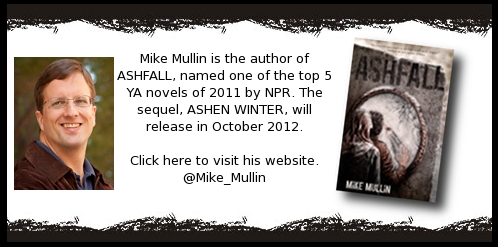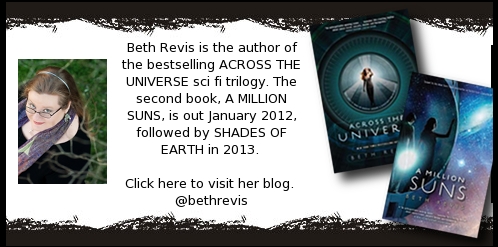Today we have a guest post from Peggy Eddleman, author of Through the Bomb's Breath, a MG post-apocalyptic adventure coming in September 2013. Learn more about Peggy below.
Let's say that you're a chef instead of a writer. (Just go with me on this one for a minute.) And you come up with the BEST recipe EVER. One that you love. You may have some different tastes in foods, but you know plenty of other people with different tastes in foods, and you know they will LOVE what you made, too. So you work hard and perfect your creation, which you've named Cheeto Peanut Butter Rainbow Jello Delight, Topped with Pineapple and Caviar. And it's truly incredible. You know not many people eat something like it every day, but if you could just get a major chain restaurant to put it on their menu, Cheeto Peanut Butter Rainbow Jello Delight, Topped with Pineapple and Caviar-loving people everywhere will cheer.
 |
| Permission granted by Mark Fickett, and by freestock.ca [CC-BY-SA-3.0], via Wikimedia Commons, and by Maks D. (My dinner) [CC-BY-SA-2.0], via Wikimedia Commons |
So you present your perfected creation to Olive Garden, P.F. Changs, Texas Roadhouse, Red Lobster, Applebees, and The Cheesecake Factory.
Every single one of them turns you down.
And they all give you the same reason-- they don't think there's a big enough market for Cheeto Peanut Butter Rainbow Jello Delight, Topped with Pineapple and Caviar to justify carrying all the ingredients in all their restaurants, training all their chefs on how to make it, advertising, and reprinting all the menus.
And really, can you blame them? They are, after all, a business. If they put things on their menu that would lose them money, how are they supposed to stay afloat? So... does that mean Cheeto Peanut Butter Rainbow Jello Delight, Topped with Pineapple and Caviar is awful? Not necessarily. Should you just give up on your dream of people eating it?
Well, that depends on what, exactly, your dream is.
If your dream is to get people to eat Cheeto Peanut Butter Rainbow Jello Delight, Topped with Pineapple and Caviar, then no-- don't give up on it! There's not a lot of Cheeto Peanut Butter Rainbow Jello Delight, Topped with Pineapple and Caviar out there, and you'd be filling a niche that not many others are.You just need to find the right way to sell it. A food truck. A roadside stand. Your own restaurant. By mail order.
If your dream is to get one of your creations in a major restaurant chain, then yes. Maybe it's time to re-evaluate the kinds of things you're submitting.
(You do get the analogy here, right?)
So what? You're telling me to give up on writing what I'm passionate
about and only write things that are commercial?!
Pshaw. Heck no. Let's take HUNGER GAMES / GREGOR THE OVERLANDER author Suzanne Collins for example. She is the daughter of a military officer, so hearing about wars and strategies and the harsh realities of what happens to children in a war-ridden country were common dinner table discussions. It fascinated her. She could've very easily taken that knowledge and fascination and written a Vietnam War narrative. Or went non-fiction, and wrote about the history behind war. She probably would've really enjoyed writing them, and some people would've really enjoyed reading them. They probably wouldn't have sold a ton of copies. Would that have been bad? ABSOLUTELY NOT. She would've been writing what she was passionate about and getting it out there for people to read. Instead, she chose to take that same knowledge and fascination and wrote something that would appeal to a much broader audience. She really enjoyed writing them, and people really enjoy reading them. Does that mean she sold out? ABSOLUTELY NOT. Because she was still writing what she was passionate about and getting it out there for people to read.
Everyone has different writing / publishing dreams and goals. Yours are more than likely exactly perfect for you. If your dream is about a specific creation, (a.k.a. a specific manuscript), no matter how outside of mainstream it is, then follow that dream! If it's about getting yours to a major publishing house, then take that fascination and passion burning inside of you, and look at what is also going to appeal to the broadest range of people.
Because like it or not, publishing is a business.
Peggy Eddleman is the author of THROUGH THE BOMB'S BREATH, a post-apocalyptic adventure for middle grade readers about a girl who can't invent, in a town where it's the most important thing. When bandits invade, inventing won't help, but the daring and risk-taking that usually gets her into trouble just might. THROUGH THE BOMB'S BREATH releases from Random House in September 2013. You can find out more about Peggy and her book at:
Twitter: https://twitter.com/




.jpg)





















